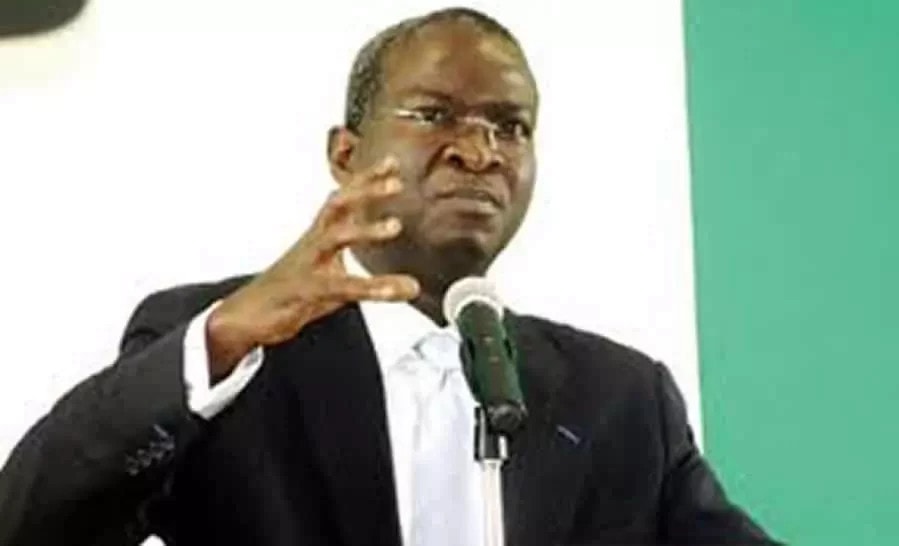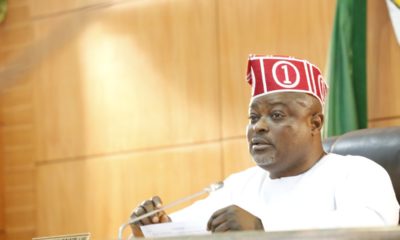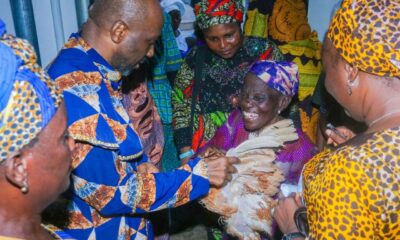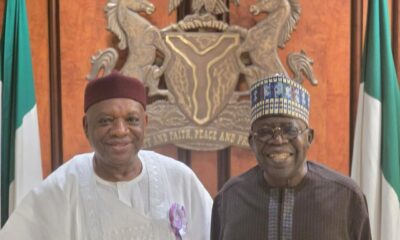Opinion
Celebrating Fashola at 57: The ‘BRF Way’ By Hakeem Bello

“BRF is a genius at breaking it down, laying it all out. When he goes on project tours, he stops to ask the artisans and food vendors on the site about how the project has touched or is touching their lives. And that’s what government communications should really be focusing on: telling and showing the actual impact / outcomes. Not just the contract sum (input) — which is what tends to make the headlines, the media love these numbers — but also the “stimulus” effect on ordinary people and communities and neighbourhoods.”
– Tolu Ogunlesi, Special Assistant to President Muhammadu Buhari on Digital Communications, on “Lessons in/from public sector communication”
Right on the money.
The stories told by these Nigerians – Abu, Sunday and others during BRF’s tours, can fill a book, but much more than that, they tell a story: Impact.
In 2017, Mallam Abu, a labourer at the site of the Gombe State National Housing Programme, told Fashola that he had worked at the site for about eight months and had been able to pay the dowry of his new wife and they were expecting a baby.
In February, Sunday Echekwu, a mason at the site of the Anambra State National Housing Programme in Isiagu Community on the outskirts of Awka, the State Capital, told the minister he and his colleagues earned N4,500 daily for their labour at the site. Prior to getting the job, he said he was doing odd jobs here and there but idle most of the time. At the same site, Mrs. Isaiah Eberechukwu, a food vendor, told him that she supplied food to the workers on the site daily, including Sundays, at N250 a plate. Her husband, Mr. Eberechukwu was also a bricklayer at the site.
Again at the site of the Delta State National Housing Programme in Asaba, the State Capital, Emmanuel Ogochukwu who spoke glowingly of the Buhari administration for giving them a source of making a living through the NHP and other people oriented initiatives which, according to him, “is impacting positively on the population, especially the unemployed youths across the country”.
For Babatunde Raji Fashola, SAN, there’s really no going about it any other way.
On assuming office in November 2015, as Minister of Power, Works and Housing one of his first moves was to invite, in batches, the over 200 Federal Government contractors – many of whom had abandoned their projects for lack of payment – for a chat. The outcome of those meetings was the re-mobilisation back to sites of the contractors, leading to the recall of over 750, 000 workers. Effect: resuscitation of the economy. As many got their jobs back, so did suppliers of materials as well as providers of food and drinks on the various sites; not to forget compensations to people whose lands were acquired to make way for roads’ construction.
Of course, while doing these, the eyes of this football-loving minister are firmly on the ball.
Currently, for him, it is work for the delivery of President Buhari’s Mandate of using infrastructure to transform Nigeria’s economy and lift millions out of poverty. Those millions would include Peter, the Painter met by the Hon. Minister at the site of the National Housing Programme(NHP) in 2019; Mrs Folake Emmanuel the Food Vendor at the site of the NHP in Oyo State and her husband, Mr Emmanuel, whose hitherto idle concrete mixer roared into action at the site fetching N20,000 daily ; Rilwan Adamu from the NHP site in Jalingo ; Fidelis the Carpenter at the NHP site in Gwagwalada , FCT ; and Engr. Obosi , the enthusiastic youth met at the site of the NHP in Ikot Ntuen /Affa Nsit , Uyo , Akwa Ibom State among so many others.
And he is on the way.
For example, out of the 643-kilometre SUKUK-funded roads which the President wants finished, a total of 411.96 kilometres have been completed from February 2019 to date.
As at February 2020, all the piling works of the 2nd Niger Bridge project had been completed while the deck is being launched and the approach roads to the bridge from Asaba and Onitsha are simultaneously being constructed. The project is scheduled to be completed in 2022.
In the Housing Sector, the Ministry has delivered a significant number of houses through the National Housing Programme and in collaboration with its parastatals – the Federal Mortgage Bank of Nigeria (FMBN) and the Federal Housing Authority (FHA), as well as by synchronising the deliverables of the Ministry and its parastatal with those of the Public Private Partnerships.
FMBN alone completed 43 Housing projects between 2015 and 2019, delivering a total of 5, 542 housing units while currently implementing 15 projects that will deliver 581 housing units when completed. The bank also issued 5, 301 mortgages totaling N38.2 billion within the period while in the last one year up to May 2020, 331 mortgages totaling N2.9 billion have been issued. It is supposed to do more with the National Cooperatives Housing Partnerships. It also granted Home Renovation Loans totaling N34.85 Billion to 42, 037 people between 2015 and 2019 and in the last one year N5.7 Billion of the loan has been granted to 6, 675 people. The FHA also has delivered 461 housing units while 1, 407 housing units are under construction.
Through road construction and rehabilitation alone, 201, 719 direct and indirect jobs were generated while 15, 158 jobs were also created through road maintenance by FERMA.
The multiplier effect of the roads’ construction can be felt in increased agricultural productivity and food security through easy evacuation of farm produce to markets across the country. This has also reduced travel time and complemented other infrastructure along the alignments where roads are constructed. Improved road infrastructure has also impacted positively on security by way of reduced crime rate on the roads.
The Sector has also contributed to the growth of mining for road construction materials such as limestone, granite, sand and laterite.
The Housing Sector has not done less either. The Sector has created 516, 998 jobs since inception of this administration, greatly impacting on the fight against poverty through empowerment skills acquisition.
Property values have appreciated between 30 and 40 per cent with approval/issuance of Certificates of Occupancy and Consents as well as provision of Road Transport Infrastructure.
The BRF Way also manifests in how he reacts to criticisms, particularly from those he considers “right-thinking and well-meaning: redoubling his efforts. “Criticisms inspire and challenge me,” he told an interviewer on a TV programme recently, “because I believe the critic…has entrusted our government, through President Muhammadu Buhari, to me with the responsibility to serve him. So in the same way that I could go to a restaurant and if the quality of food is not good, I am entitled to complain. I see critics in that light. Really and truly what I used to say is that if critics ask more of us we must feel proud that they are asking more of us because they actually believe we are capable of doing it. If they don’t believe in our ability to do more, they won’t ask us. So now that they are asking us I am inspired.”
Doing more is the BRF Way to make the other class of critics – those “who make comments about things they are not aware of” and “those who do not believe anything” recant. When in February, he was inspecting the 2nd Niger Bridge project, one of the journalists on the tour went to him and apologised profusely for writing uncharitable and unconfirmed things about the project. By way of response he took the journalist to the top of the bridge where decks were already being laid. They took photographs there and in his excitement the journalist posted the photograph on his medium’s online platform.
The BRF Way sure works.
And, as Fashola clocks 57 today, one can’t but pray to the Almighty to keep giving him ideas to perfect The BRF Way for the greater good of mankind.
• Mr Hakeem Bello, FNGE is Special Adviser
Communications to the Hon.Minister.
Continue Reading

























